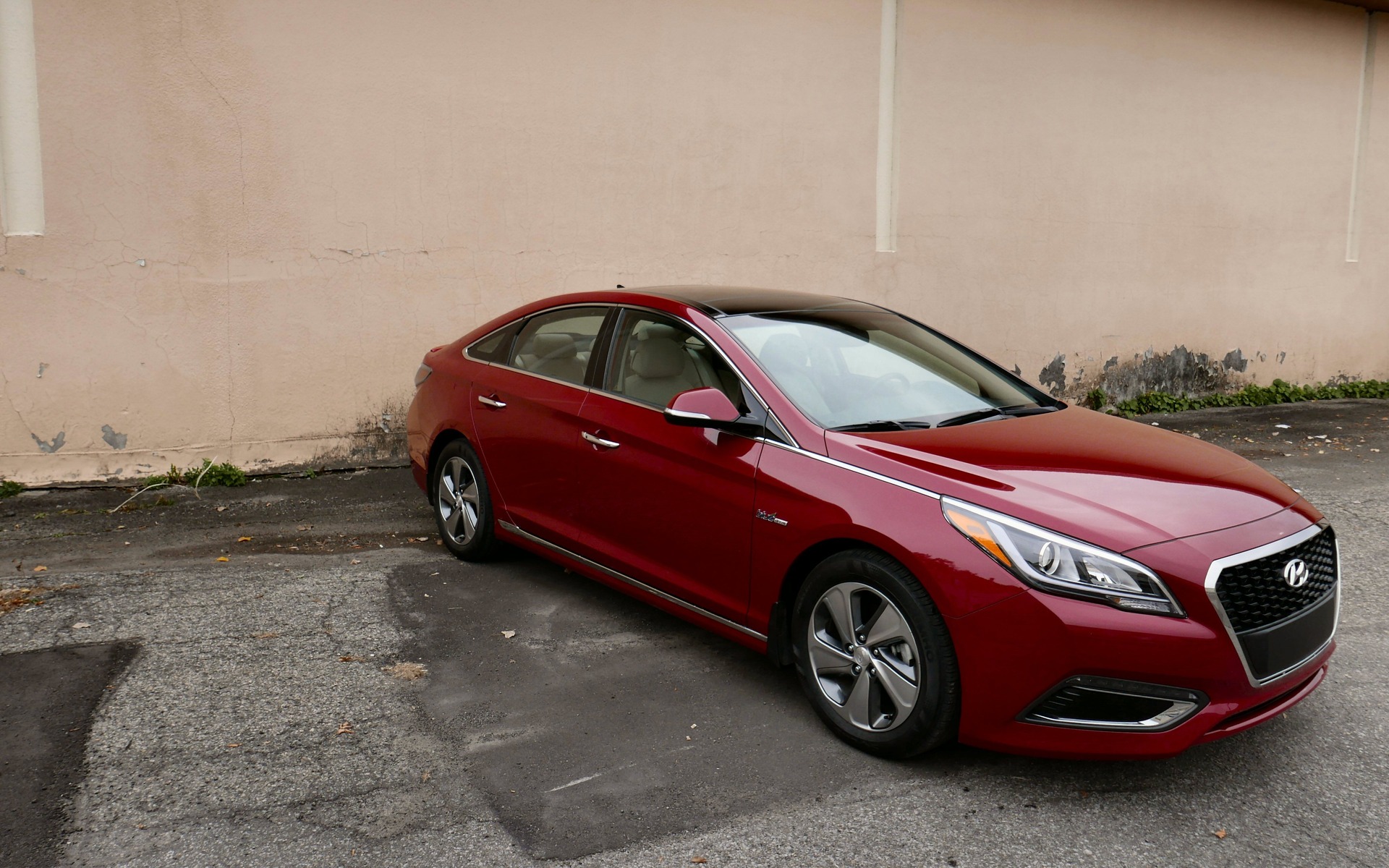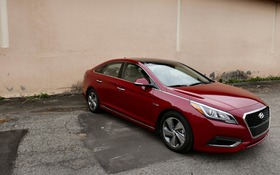2016 Hyundai Sonata Hybrid: Second Take Success

| Strong points |
|
|---|---|
| Weak points |
|
As good as the previous-generation gas-only Hyundai Sonata was, the Hybrid model simply couldn't match it. Somehow, the decision to plug an electric motor in place of the torque converter in the four-cylinder Sonata's six-speed autobox created a sedan that was less than the sum of its parts: the Hyundai felt rough in regular driving, especially when the four-banger fired up under the hood. It was a decent first effort, but not nearly up to the high standard set by the standard Sonata, nor nearly smooth enough to compete with rivals from Ford (the Fusion Hybrid) or Toyota (the Camry Hybrid).
Fresh off of last year's redesign, the Hyundai Sonata Hybrid is ready for take two, and after spending nearly 500 kilometres behind the wheel of the new eco-friendly model I can cheerfully report that much of what the older battery-assisted Sonata got wrong has been corrected for 2016. The template for the car stays the same, but the execution has risen to the requisite level for Hyundai to compete in the admittedly-small hybrid family sedan segment.
Rethinking The Basics
Unlike more complex, CVT-based drivetrain management systems such as Toyota's Hybrid Synergy Drive, Hyundai's decision to stick with its electric motor + traditional automatic transmission + gasoline engine setup saves a ton of development dollars for the brand. Unfortunately, if the software's not quite up to par then you end up with the debacle that was the original Sonata Hybrid's driving experience.
The 2016 Hyundai Sonata Hybrid's gas engine sees a major upgrade with the new sedan, swapping in a 2.0-litre direct-injected four-cylinder in place of the noisier 2.4-litre, but this doesn't translate into extra grunt: even with a somewhat more powerful electric motor in the mix, the Sonata Hybrid's overall output rating drops six ponies to 199 total system horsepower. It's certain the most drivers won't notice the drop-off, because Hyundai has taken important steps to eliminate the rough character of its hybrid setup. Power delivery from the engine and battery-powered motor is smooth, if not all that lively, and there's even a Sport mode to enhance throttle response and give you the illusion of quickness. Furthermore, the six-speed transmission is no longer a burden, and while it's not quite as glassy as the 'gear changes' offered by competing CVT hybrid designs, there were only a few instances where harder, delayed shifts had me questioning the Sonata's programming.
Comfortable Cruiser
One of the more impressive aspects of the 2016 Hyundai Sonata Hybrid is how aggressive the car is about engaging its electric motor and shutting down the engine under the hood to save on fuel. At lower speeds it's electric all the way, but even during highway cruising there were times when I looked down and was surprised to see the green EV icon lit up on the dash (even with my foot on the accelerator to maintain a steady pace). This is a trait it shares with its predecessor, minus the harsh transitions between one power source and the other.
The Hyundai was a pleasant highway companion during a jaunt down to the ski resort area of Stowe, Vermont, with its comfortable chassis absorbing some of the state's rougher secondary roads with ease. An extra effort in sound deadening has paid dividends for the Sonata Hybrid, too, as the car's aerodynamics and insulation muffled the outside world to a pleasing degree. There were two flies in the ointment, however - a non-adaptive cruise control feature that inexplicably kept losing and gaining speed at random, and a lack of progressive feel from the regenerative braking system that had me constantly second-guessing how much pressure I needed to apply to get the sedan to actually stop.
Impeccable Interior
Hyundai has done an excellent job of providing customers with cabins that feel just a little higher class than their automobile's purchase price would suggest. This continues in the Sonata Hybrid, which I sampled in Limited trim. Heated seats front and rear, leather upholstery, an excellent LCD touchscreen infotainment system, and a hands-free trunk that opens on its own if you stand near the rear of the car with the key in your pocket are all included as standard equipment. The latter is a useful feature, but it startled me the first time it happened because I hadn't been intending to use the trunk at all (which, I must note, offers a lot more storage space compared to the original Sonata Hybrid thanks to better battery placement).
Pay To Play Green
Hyundai has done a fairly commendable job at mixing its Hybrid option into the general Sonata landscape. The most affordable version of the battery-assisted sedan starts at just under $30,000, with the Ultimate trim level cresting $37,000. In comparing Limited trim levels the gas-only model is more powerful but also more expensive by roughly $1,000, and doesn’t feature the same standard of equipment.
You don't have to go all-in with the Sonata Hybrid Ultimate to walk away with a well-appointed, and very efficient automobile - the Limited will do just fine - which is a welcome trend away from the premium pricing of some of the Hyundai's cross-town competitors. Although my real-world fuel efficiency numbers of 7.8 l/100 km in mixed driving were a litre or two above the factory rating, the fuel-sipping habits and attractive window sticker of the Sonata Hybrid prove that the Korean automaker has finally figured out how to properly package its eco-conscious drivetrain.











